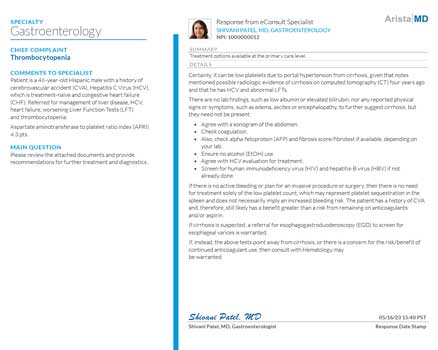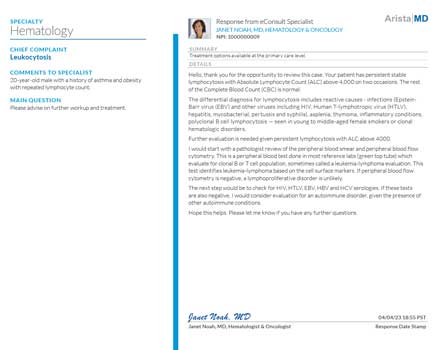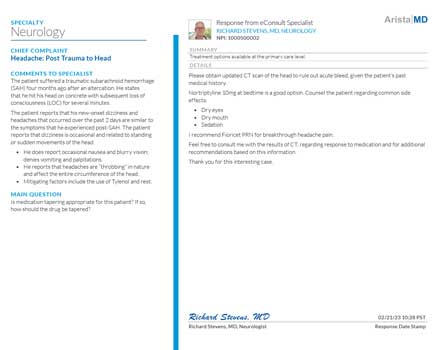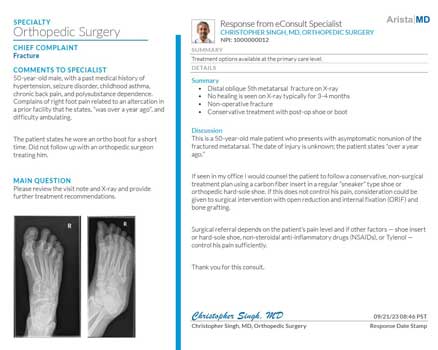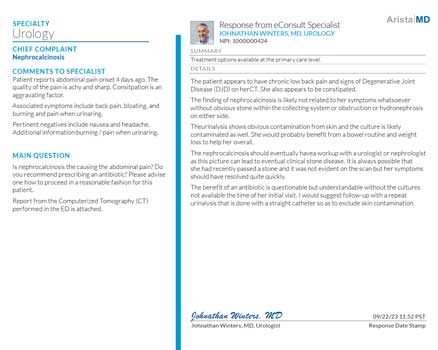At-risk practices focusing on high-value eConsults see the greatest benefits from their eConsult programs — healthcare cost savings and improved patient outcomes. With considerable time and effort, at-risk practices identify patients at high risk of serious health events, such as emergency department visits or inpatient hospitalizations, and prevent them. At AristaMD, we are taking this strategy to the next level by considering which specialties have:
- Long wait times
- Higher costs
- Address conditions easily managed in the primary care setting
Using eConsults for specialties with these characteristics are the most likely to drive healthcare cost savings, improve outcomes and decrease the risk of:
- ED use – a costly alternative to a specialist visit.
- Unscheduled or canceled specialty care appointments.
- Boomerang appointments to primary care.
What is a high-value eConsult?
A high-value eConsult is a request for guidance in a specialty area that is particularly expensive to the patient, your practice and the wider industry.
Specialties with long wait times
Evaluating wait times is more complicated. Specialists are often concentrated in urban areas and maldistributed throughout the country. In the 2022 Survey of Physician Appointment Wait Times and Medicare and Medicaid Acceptance Rates, Merrit Hawkins reports that the average wait time to see an orthopedic surgeon is 16.9 days. However, the average across the U.S. reflects relatively short wait times in some areas.
The average wait time to see an orthopedic surgeon is 16.9 days, up from 11.4 days in 2017, a 48% increase. Average wait times to see an orthopedic surgeon range from a high of 55 days in San Diego to a low of 5 days in Washington, D.C.
The same report indicates that the average appointment wait time in all five specialties surveyed was 45.6 days in Portland, Oregon. One driver of these long wait times is that not all specialists accept Medicare and Medicaid. This is also an issue for patients with traditional healthcare coverage.
This burdens the patient, who must find an in-network provider nearby that can schedule an appointment within a reasonable time frame. The patient is less likely to schedule and attend a specialist appointment:
- When the wait time is extended.
- Travel distance to the specialist is significant.
- Cost of the appointment is high — the patient has high-deductible insurance, or the specialist is out-of-network.
In addition, patient referrals are often prioritized by the urgency of the condition. A patient with a non-emergent condition will usually wait longer to see a specialist.
Finally, scheduling an appointment with a specialist is only the first step — patients visiting a specialist average three encounters with a specialist for each condition.
Unnecessary referrals and testing
A study published in the Journal of The American Board of Family Medicine reported that more than half of referrals were for consultation rather than direct intervention. Patients needing a quick visit with the specialist for a change in medication, confirmation of the PCP diagnosis or testing recommendations may wait weeks because specialists’ schedules are filled with patients receiving ongoing care.
These referrals are unnecessary when the PCP has access to physician-to-specialist consultations. They also increase the cost of care and create barriers for the patient to receive diagnosis and treatment.
Unnecessary referrals can also create a boomerang effect in primary care practices. Patients unable to access advice from a specialist will schedule follow-up appointments with their PCP to manage symptoms or request that the PCP expedite scheduling with the specialist. This is particularly true for patients with chronic conditions. The average number of primary care visits is greater than the number of visits to specialists for the diagnosis as well as for comorbid conditions.
Duplicate and unnecessary testing adds to the expense of these referrals. $200 billion, or 25% of our healthcare costs, are for unnecessary tests and treatments – not including ED visits or the increased care costs because the patient’s condition goes untreated.
An ABIM Foundation survey reveals that PCPs consider these additional expenses a problem. 66% of doctors surveyed reported that they feel a responsibility to help prevent patients from receiving avoidable tests and procedures. 72% of those surveyed believed that the average doctor prescribes unnecessary care — tests or procedures — at least once a week.
Deploy high-value eConsults to achieve healthcare cost savings
When you know your patient population, as most at-risk practices do, it’s easy to identify opportunities to deploy high-value eConsults.
- Consider the patient’s condition. If it’s not urgent, procedural or diagnostic, it’s likely a good candidate for eConsult.
- Look for common referrals. Patients with chronic conditions and abnormal lab results and those you suspect you can manage with guidance from a specialist.
- Focus on expensive specialties. The specialties listed above are an excellent place to start.
- Ask your patients. When patients return to the office after you’ve referred them to a specialist, ask them why they haven’t scheduled the specialist appointment. Their feedback will reveal which specialties have the longest wait times in your area.
What conditions can eConsults address in these specialty areas?
Let’s look at the most expensive specialties to identify common conditions you can address in the primary care setting. The lists below are not inclusive but include chief complaints from AristaMD eConsults, where the eConsult response indicated: Treatment options are available at the primary care level.
Cardiology
- Abnormal Echocardiogram (ECHO)
- Arrhythmia
- Atrial Fibrillation
- Bradycardia
- Congestive Heart Failure
- EKG Review
- Hypertension
- Palpitations
- Peripheral Arterial Disease
- Pre-Operative Risk Assessment
Gastroenterology
- Abdominal Pain
- Abnormal Abdominal Imaging
- Diarrhea, Nausea or Vomiting
- Elevated Liver Function Tests
- Fatty Liver Disease
- GERD
- GI Bleed/Anemia
- Hepatitis B & C
- Irritable Bowel Syndrome
- Pancreatitis (Chronic or Recurrent)
Hematology
- Abnormal Lab Results
- Anemia
- Coagulopathy
- Eosinophilia
- Leukocytosis
- Leukopenia
- MGUS
- Neutropenia
- Other
- Platelet Disorder
- Polycythemia
- Thrombocytopenia
- Thrombocytosis
Neurology
- Abnormal Imaging (Review & Evaluate)
- Abnormal Imaging Study
- Abnormal Movements/Tremor
- Back and Limb Pain
- Cognitive Impairment/Memory Loss
- Distal Polyneuropathy
- Epilepsy or Seizure
- Headache
- Memory and Aging
- Multiple sclerosis
- Peripheral Neuropathy or Distal Numbness
- Tremor or Parkinson’s
- Vertigo/Dizziness
Orthopedics
- Abnormal Lab Results
- Extremity Fracture
- Hip Pain
- Knee Pain
- Low Back Pain
- Neck Pain
- Patellofemoral Knee Pain
- Sciatica
- Shoulder Pain
Otolaryngology (ENT)
- Ear Pain, Ear Infection or Ear Tubes
- Epistaxis
- Head or Neck Mass
- Oral Cavity/Oropharynx Lesion
- Nasal Congestion, Rhinitis or Sinusitis
- Snoring or Sleep Disordered Breathing
- Sore Throat, Tonsillitis or Recurrent Tonsillitis
- Tinnitus
- Wax Impaction
Urology
- Urology
- Abnormal Prostate or Elevated PSA
- Bedwetting or Nocturia
- Benign Prostatic Hyperplasia (BPH)
- Chronic Kidney Disease
- Dysuria
- Hematospermia
- Hydronephrosis
- Microhematuria
- Nephrolithiasis
The number of requests for these specialties continues to increase, with replaced visit rates exceeding 80%. Is it time for you to rethink your eConsult strategy?
Find out how you can drive healthcare cost savings. Request a demo today.



